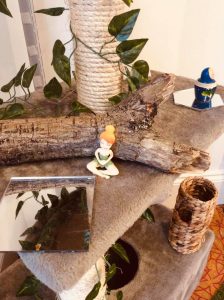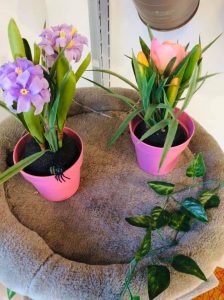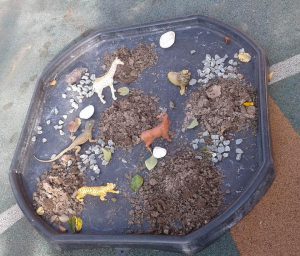Small World Play
Small World Play
Small world play is used to describe imaginative play which allows children to act out scenarios, using ‘small’ toys and objects. The imagination really can run wild with small world play; children can immerse themselves in scenes from real life, stories or just completely use their imaginations. Small world scenes often focus around a particular interest and at the Wigwam Day Nursery and Preschool we follow those interests and help to create worlds that the children are really interested in. It can be anything from fairy gardens to dinosaur worlds, exploring space or creating a bug farm. Zoos, farms, homes, hospitals….anything goes in a small world activity!
Small world play has many learning and development benefits for children, and it’s completely accessible, requiring very few resources. Some of the best small world play comes from everyday objects; cardboard boxes that become a zoo enclosure, a plant pot that becomes a fairy garden, an empty tube that’s a train tunnel. Add in some natural resources – some leaves from the garden, flour if it’s snowing in your small world, a wooden spoon to become a slide for the swimming pool. Most small worlds will then have a ‘toy’ such as a person, car, animal figurine to act out the child’s imagination.
As The Playground Professionals say, No two small worlds will ever be the same. Every time a child engages in small world play it will be a different experience, one which will become more complex as they grow and develop!
Small world play is a fantastic way to develop:
- Imagination – it’s okay if the farm has pigs, tigers and dinosaurs! The only rules are the ones the child creates
- Communication – just take a moment to listen to the words, phrases and instructions a child will give to their small world characters!
- Social skills – small world can be an individual or a group activity, but even as a solo-activity the child will be developing their understanding of social interactions through their characters
- Physical development – lots of fine motor skills and spatial awareness at work to manipulate and work their way through the small world
- Understanding the world around them – these activities let children make sense of the world around them, if there’s a vehicle in their small world do they act out safety skills – traffic lights and their characters crossing the road safely?
- Emotional development – is a small world character sad? Happy? Lonely? Acting out emotions and responses to emotions, whether playing individually or in a group is a fantastic skill that can be developed through small world play.
The ability to create stories using small world play resources allows children to express themselves, and helps early years practitioners and parents gain an insight into how their child is thinking, feeling and developing.



Mon 9th Dec